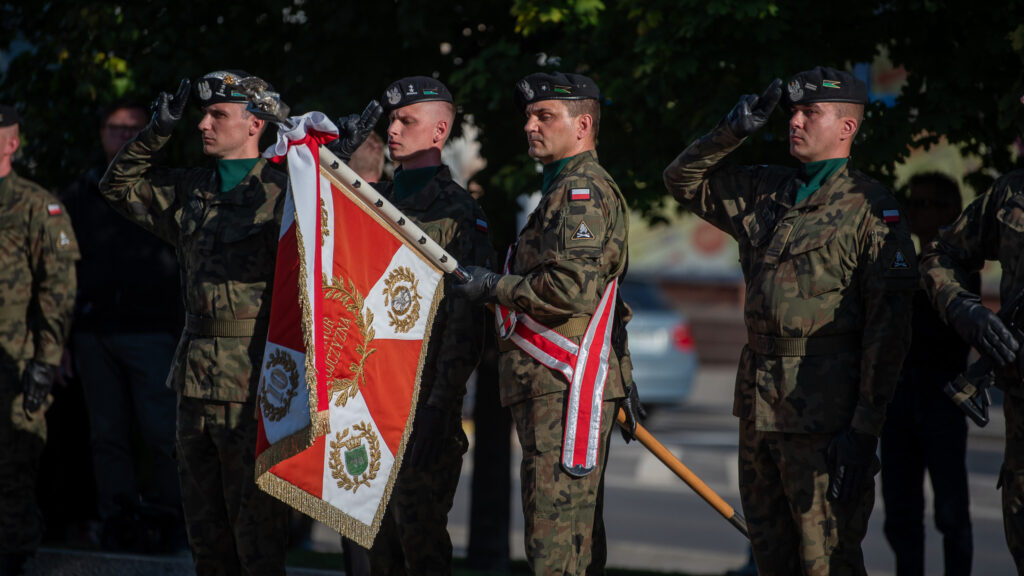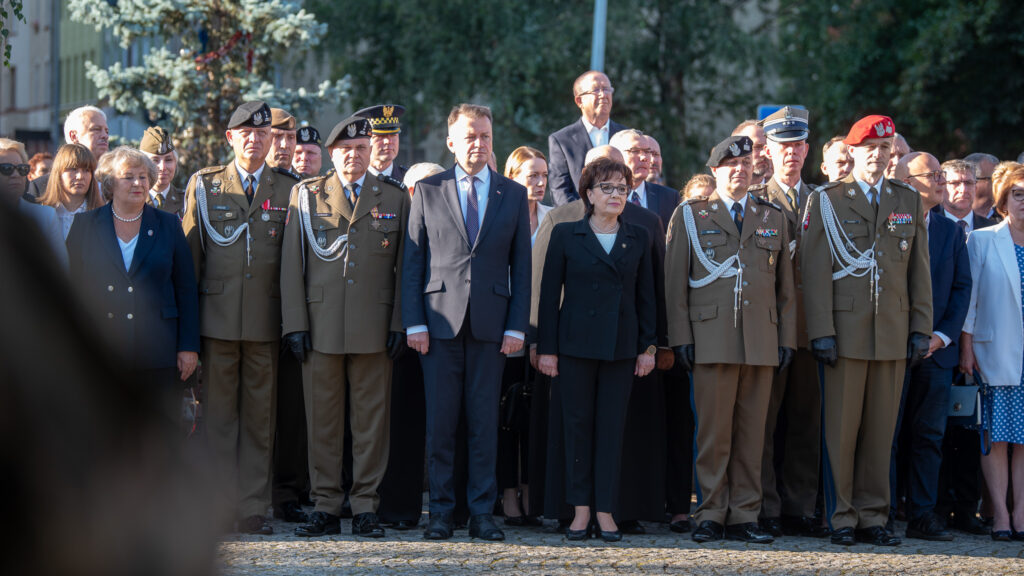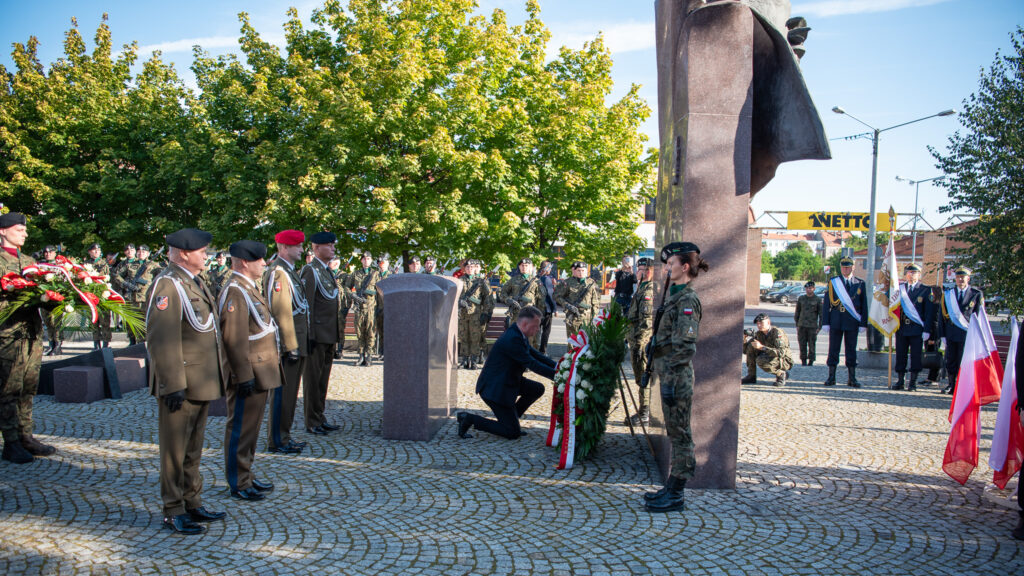
“Indeed, September 17, 1939 was a tragic date. Then we were attacked by Soviet Russia. On the basis of the Molotov-Ribbentrop Pact, the Germans and the Russians divided Poland once again in our history. The fate that befell the Poles after the entry of the Red Army was a tragic fate” – Mariusz Błaszczak, Minister of National Defense said during the ceremony commemorating the Soviet aggression against Poland.
On Sunday (September 17 this year), in Legnica, the head of the Ministry of National Defense participated in ceremonies commemorating the 84th anniversary of the Soviet aggression against Poland and the 30th anniversary of the withdrawal of Soviet troops from Poland.
On September 17, 1939, the Soviet Union attacked Poland. In this way, Stalin fulfilled the August secret agreement with Hitler (Ribbentrop-Molotov Pact), which provided for joint aggression against the Republic of Poland, the occupation and division of its territory, and the actual liquidation of the Polish state.
“Then, 84 years ago, deportations to Siberia began. They lasted up to several weeks. Many people did not survive this journey, which took place in tragic conditions, in cattle wagons. Later, our compatriots were sentenced to slave labor. I would like to strongly emphasize that both the Russian and German occupiers treated Poles in the same way. (…) They intended to murder the Polish elites, they intended to create a situation in which Poland would not be reborn, but Poland was reborn. Today, Poland is an independent country. Proud of its history. And all these things, which we survived, all these experiences build our national identity” – said Minister Mariusz Błaszczak during the ceremony.

The Third Reich attacked Poland on September 1, 1939, which was the beginning of World War II. On September 17, 1939, the Red Army attacked Poland along the entire eastern border of the Second Polish Republic. The Soviet occupation began in Poland, which soon led to the Katyn genocide and mass deportations of Poles to the east.
“Today we can be happy that Poland is free. We are doing everything to ensure that Poland remains free. What happened 30 years ago – the withdrawal of Soviet Russian troops from Legnica, from Poland – is also a very important point in our history. Here we must remember merits of the government of the late Prime Minister Jan Olszewski” – the head of the Ministry of National Defense noted.
“Today let us look at what is happening behind our eastern border. How Russia is trying to rebuild the empire using the same methods as in 1939. To prevent a repeat of what happened 84 years ago, so that Poland is not exposed to attempts to rebuild the Russian empire, we are creating the Army Polish. Strong! One that will make the aggressor not dare to attack Poland. 84 years ago we were alone. Today we are creating a strong Polish Army to deter the aggressor. We are equipping the Polish Army with modern weapons, we are increasing the numbers of the Polish Army. (… ) I encourage all residents of Legnica, Lower Silesian Voivodeship, those who have not yet decided what they want to do in life, to join the Polish Army. To create the strength of the Polish Army. To become professional soldiers or to serve in the ranks of territorial defense forces. It is really worth being a soldier of the Polish Army and take part in the process of creating a strong Polish Army” – Minister Mariusz Błaszczak said.
During the ceremony commemorating the 84th anniversary of Soviet aggression against Poland and the 30th anniversary of the withdrawal of Soviet troops from Poland, Elżbieta Witek, Speaker of the Sejm of the Republic of Poland, and Mariusz Błaszczak, Minister of National Defense, laid a wreath in front of the Monument to the Exiles of Siberia.

On September 17, 1939, Poland, fighting against German aggression, was attacked by the Red Army. This attack was the implementation of the Soviet-German plan to liquidate our country. It was another partition of Poland. Alone in the fight, we were unable to oppose two powerful enemies. It was a foreshadowing of Katyn and the ordeal of the prisoners of the Soviet terror system.
“Guard of Rememberance”
On the eve of the anniversary of the Soviet aggression against Poland, September 16, 2023 at 5.30 p.m., representatives of state and local authorities, in cooperation with local communities, paid tribute at several dozen places of national memory. These are places commemorating the Polish victims of the Soviet attack of 1939 and the repeated entry of the Soviets into Polish lands in 1944-1945. Guards of honor were posted at graves and monuments.
Deputy President of the Institute of National Remembrance, Ph.D. Karol Polejowski paid tribute to the soldiers of the 60th Polish Army Division “Kobryń”, who died fighting the Soviet aggressor in the Battle of Jabłoń and Puchowa Góra. The division was part of the Independent Operational Group “Polesie” under the command of General Franciszek Kleeberg. The celebrations took place at the parish cemetery in Jabłoń, where there is a grave of 16 Polish Army soldiers killed in battle.
“Guard of Rememberance” is a nationwide campaign to commemorate the victims of Soviet aggression. It is organized on the initiative of the Józef Piłsudski “Strzelec” Rifle Association and the Rekonstruktorzy.pl Foundation. The honorary committee of the action consists of: the Speaker of the Sejm Elżbieta Witek, the Minister of National Defense Mariusz Błaszczak and the president of the Institute of National Remembrance, Dr. Karol Nawrocki.
As part of cooperation with the organizers of the “Guard of Rememberance” campaign, the Institute of National Remembrance will conduct educational activities in several dozen schools located near memorial sites. During classes, students of grades 8 of primary schools will listen to lectures about the circumstances of the Soviet aggression against Poland in September 1939 and the crimes committed by the Red Army and communist militias on Polish soil.
AW
Source: MON, IPN
